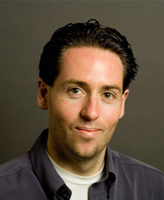
Post-doctoral fellow Errol Philip made history this fall when he became the first two-time winner of a prestigious American Psychological Association graduate student award—just the latest in a long list of accolades.
Philip won the APA’s Division 17 Health Psychology Graduate Student Award for his paper, “Depression and Cancer Survivorship: Prevalence Rates and the Importance of Coping Self-Efficacy in a Sample of Long-Term Survivors." He won the award in 2008 for a paper on quality of life in cancer patients.
He recently completed an internship at Yale University School of Medicine and successfully defended his dissertation at Notre Dame. This past spring, Philip also won the Graduate Student Research Award from the Ethnic Minority and Multicultural Health Special Interest Group at the Society for Behavioral Medicine.
Now in the midst of a two-year, post-doctoral appointment at Memorial Sloan-Kettering Cancer Center, Philip credits the supportive environment at Notre Dame for much of his success. During his first year at Notre Dame, for example, Philip was awarded a Zahm Travel Grant to spend the summer at Sloan-Kettering, where he developed relationships with people who were mentors throughout his graduate program and were instrumental in landing his post-doctoral fellowship.
“I don’t think I would be where I am today without some of the support I received from Notre Dame and my mentor, Professor Tom Merluzzi,” Philip says.
A native of Australia, Philip became interested in the psychology of cancer survivors while working with a group that provided support services to cancer patients in Melbourne, where he earned his undergraduate degree in psychology. In 2006, he came to Notre Dame specifically to work with Merluzzi, a professor of psychology who studies coping processes in people with cancer and also serves as director of the College of Arts and Letters’ Institute for Scholarship in the Liberal Arts.
A few years ago, a Notre Dame alumni newsletter featured a story on Merluzzi’s lab and Philip’s research on cancer survivors. “The story made mention of the fact that for many patients, life doesn’t just go back to normal after treatment."
The message resonated strongly with alumni who were also cancer survivors, a number of whom called or sent emails to Merluzzi’s lab in the Department of Psychology. This feedback became the impetus for Philip’s most recent, award-winning research.
The study looked at the rates and predictors of depression in individuals five to 10 years after the completion of cancer treatment. Philip found that even though far removed from treatment, a significant minority of people were reporting symptoms of depression at a rate higher than would be expected in the general population. He also found that people’s confidence in being able to manage the physical symptoms associated with cancer, such as pain and fatigue that continued after treatment, was a very strong predictor of how much depression they reported.
Philip hopes the findings can be used to implement interventions that will help equip survivors with skills that may reduce their chances of experiencing significant depression.
“It is only somewhat recently—as more people are living with a cancer diagnosis—that we are becoming aware of the challenges these individuals face in survivorship,” he says. “It is important that we look at the long-term effects of cancer and its treatment, and how best to assist people in managing these challenges.”
At Sloan-Kettering, Philip will continue his research examining the long-term challenges that survivors face, and the most effective form of support that health professionals can offer them. He is also focusing on the role lifestyle factors play in cancer and identifying what survivors can do to reduce their risk of recurrence or future disease, as well as how health professionals can help promote these efforts.
Merluzzi calls Philip one of his best graduate students and one of the best in the clinical psychology program, in large part due to Philip’s boundless energy and unparalleled work ethic.
“We continue to collaborate on research, though I have trouble keeping up with his productivity,” Merluzzi says. “It is a pleasure to work with a student like Errol, where at some point in the process of mentoring, one stops and admits that the mentoring is mutual.”
Learn More >
- Department of Psychology
- Clinical Psychology Program
- Tom Merluzzi faculty page
- Related story: Psychology Graduate Student Focuses on Cancer Survivors
- Institute for Scholarship in the Liberal Arts
Originally published by at al.nd.edu on January 27, 2012.